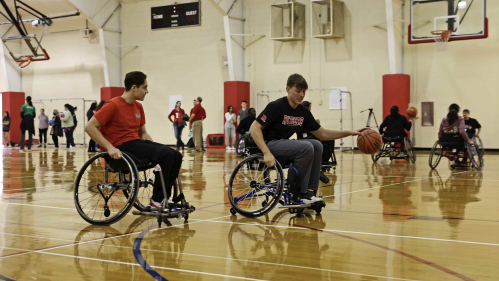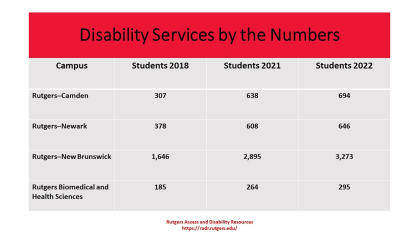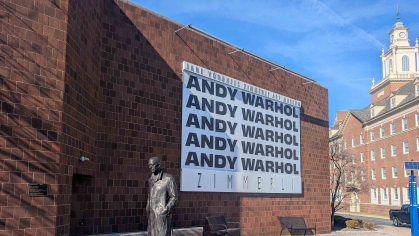More Rutgers Students Seeking Assistance From the Office of Disability Services

The pandemic has led to more awareness of mental health issues as well as more students experiencing long-term effects of COVID-19
The Office of Disability Services at Rutgers University has seen a rise in students seeking mental health and other services over the past five years, with the biggest jump happening during the COVID-19 pandemic.
It is a situation that is being felt at universities and colleges throughout the United States, said Carlie Andrews, senior director of the Office of Disability Services (ODS) at Rutgers University–New Brunswick. She added the increased number of students seeking services is being felt “across the Big 10” as students have realized that there are different, more accessible ways to learn.
“The pandemic hits and we move everything online,” said Andrews, adding that more students are experiencing long-term effects of COVID-19. “Instructors are doing things very differently than they were ever done before. And students are suddenly realizing, ‘Oh, there's a different way to do this.’ For some students, it was awful. And for some students, it was amazing.”
How is online learning better for some students? There are “different reasons for different students,” Andrews said.
“For some, it was the ease of not needing to worry about how they were going to physically get to class,” she said. “For others, it was discovering how much better they learned when lectures were recorded and they could go back and listen at their own pace as many times as they needed.”

The Office of Disability Services serves nearly 5,000 students throughout the university, including more than 3,270 students at Rutgers–New Brunswick. Today, that means helping more students with anxiety and depression by giving them more crucial access through technology to the university and its resources, said Kathy Loder-Murphy, an assistant director at ODS in New Brunswick.
“Zoom access is absolutely one reason why our numbers have increased, because students don't have to get on the bus at Rutgers and come over to see us,” Loder-Murphy said. “They can Zoom meeting in two seconds and it's much easier. So, I think that also has really helped.”
The university provides accommodations for students who are taking online classes and works with faculty to ensure that online courses are accessible to the students, officials said.
The goal of the office is to support all students in need, including those with invisible disabilities, Andrews said.
There's so many more people who are dealing with things like anxiety or depression or chronic disabilities and they're coming forward because they know they need the services and the access.
Kathy Loder-Murphy
Assistant director at the Office of Disability Services
“For the first time ever this year, over 50 percent of the students that registered with our office were registering with some type of psychological condition,” she said. “You can't see that. It's very easy for people to make an assumption that we don't have a lot of students with disabilities here at Rutgers. Well, we do. So, what is it that we're doing to make sure that we're creating a welcoming and inclusive environment for them?”
“There's so many more people who are dealing with things like anxiety or depression or chronic disabilities and they're coming forward because they know they need the services and the access,” said Loder-Murphy.
She said while “Rutgers always had a drive and a mission to help support students with disabilities,” the Americans with Disabilities Act of 1990 compelled colleges and universities to expand and formalize support services for students with disabilities.
Rutgers Access and Disability Resources – RADR for short – was formed in 2016 to give oversight and support for all student disability-related accommodations, services and initiatives throughout the university. RADR provides institution-wide support for assistive technologies, course materials in alternate formats, sign language interpreters, captioning of videos and computer aided real-time transcription.
The pandemic hits and we move everything online. Instructors are doing things very differently than they were ever done before. And students are suddenly realizing, 'Oh, there's a different way to do this.'
Carlie Andrews
Senior director of the Office of Disability Services at Rutgers–New Brunswick
“We work collaboratively with our colleagues at ODS and the administration to ensure equal access, opportunities and participation of disabled students at the university,” said Bill Welsh, an associate vice president who oversees the office and works with disability services personnel at every campus location. “ODS and RADR work as a team to support disabled students to provide consistent policies, processes and procedures throughout the university so that the student experience is similar regardless of the campus they attend at Rutgers.”
“Bill has oversight over all of them, but we each have our own separate team,” said Loder-Murphy. “Each of us has a director and coordinators and run our own accommodations, but we collaborate every Wednesday on cases. We have a lot of contact with the other campuses. We also have a lot of students who transfer back and forth between some of the campuses, so it's nice to have a connection from different places.”
In addition to the New Brunswick location on Livingston Campus at Lucy Stone Hall (Suite A145, 54 Joyce Kilmer Ave., Piscataway), the Office of Disability Services has locations at Camden, Newark and Rutgers Biomedical and Health Sciences (RBHS).
The office provides various support services for Rutgers students, a number of which focus on assistance with taking exams, including:
-
Providing extended time on tests
-
Reduced distraction testing locations
-
Use of scribes or readers
-
Access to assistive technology during an exam
Services also include early registration. Bob Loder, an ODS assistant director in New Brunswick, said the office provides other resources, too, including note-taking services via peer note takers or electronic devices.
“That’s our second biggest area of service,” Loder said.
Faculty may learn more about how to extend the time on an exam at https://radr.rutgers.edu/resource/extended-time-exams.


